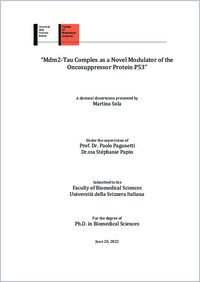Mdm2-Tau complex as a novel modulator of the oncosuppressor protein P53
- Sola, Martina
- Paganetti, Paolo (Degree supervisor)
- Papin, Stéphanie (Degree supervisor)
- 2022
PhD: Università della Svizzera italiana
Neurodegeneration
Tau
Cancer
Mdm2
P53
Alzheimer’s disease
Dna damage
Dna damage response (ddr)
Tauopathies
Aging
Loss-of-function
English
Cancer and neurodegenerative diseases are unmet medical needs with increasing incidence worldwide. Despite distinct pathogenic characteristics, these two devastating human illnesses share aging as a main risk factor. Aging is characterized by a continuous exposure of the organism to metabolic or environmental stress conditions eventually leading to irreversible consequences. An example is the accumulation of DNA lesions resulting from the large number of daily insults occurring in each cell of our body. To protect the organism, a complex molecular response to DNA damage has evolved. The DNA damage response is orchestrated by the master regulator P53, which stops the cell cycle and induces the DNA repair machinery. However, in case of an irreversible damage to the DNA, P53 is also inducing removal of the damaged cell either by a cell death program or by cellular senescence. DNA damage accumulation and abnormal cell fate decision may contribute to the pathomechanism shared by aging-associated disorders. Tau is a microtubule-associated protein well-known for its implication in tauopathies, including Alzheimer’s disease. These neurodegenerative disorders are characterized by the progressive brain deposition of hyperphosphorylated forms of Tau fibrils, a process correlating with protein toxicity, neuronal cell loss and clinical symptoms. Additional functions of Tau in DNA protection, chromatin remodeling and in cancer emerged recently. Therefore, the aim of the current thesis project is to prove the hypothesis that a loss-of-function of Tau may contribute to human aging-associated diseases. Utilizing Tau-depleted neuroblastoma cells as a model of loss-of-function, I carefully dissected the DNA damage response. This led to the demonstration that cells with depleted Tau decreases P53 stability and activity resulting in an unbalanced induction of cell senescence and reduced cell death. This effect was reversed using an inhibitor of the interaction between P53 and its ubiquitin ligase MDM2. The data suggest thus that Tau may interfere with MDM2-dependent ubiquitination of P53. Indeed, I showed by applying different technologies the existence of a Tau-MDM2 complex in cells and defined which structural domain of each binding partner drives this interaction. Then, I exposed that Tau bound to MDM2 inhibits its P53 ubiquitination. Notably a Tau variant causing frontotemporal dementia has a reduced inhibitory effect. Finally, I report a colocalization of MDM2 with Tau neurofibrillary tangles in Alzheimer’s disease brain. Linking Tau to P53 and cell fate decision in response to a cellular stress represents a tangible breakthrough for the understanding of aging-related human diseases. Taking into consideration the molecular mechanism exposed by the data obtained in my work, the role of the P53-MDM2 axis in neurodegenerative diseases as well as the implication of Tau in the pathogenic process of cancer should be reassessed.
- Collections
- Language
-
- English
- Classification
- Medicine
- License
-
License undefined
- Open access status
- green
- Identifiers
-
- NDP-USI 2022BIOMED005
- URN urn:nbn:ch:rero-006-121094
- ARK ark:/12658/srd1321074
- Persistent URL
- https://n2t.net/ark:/12658/srd1321074
Statistics
Document views: 326
File downloads:
- 2022BIOMED005: 335
